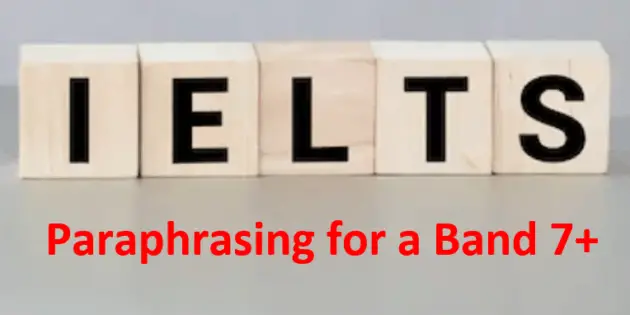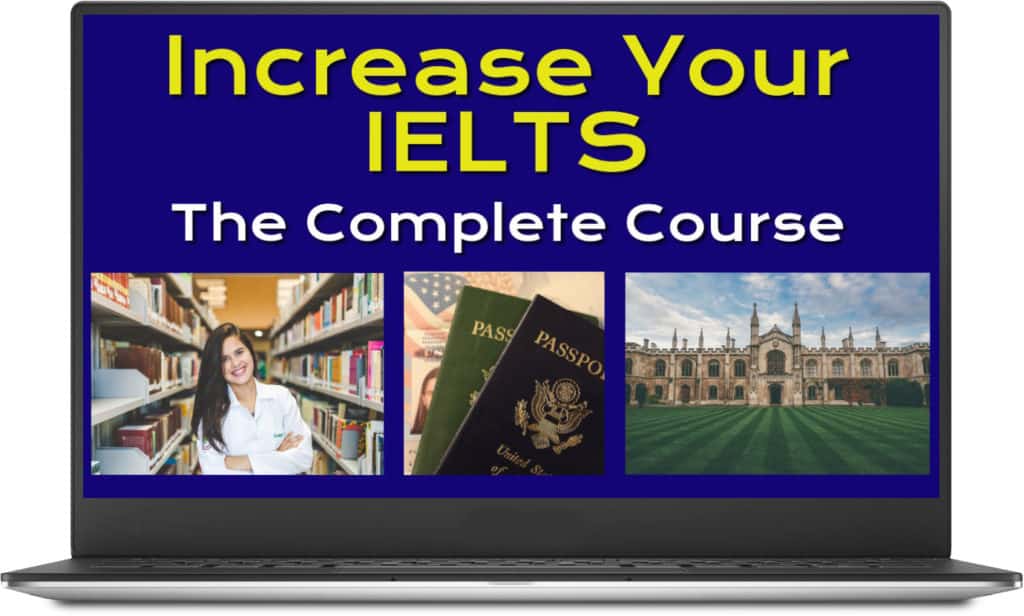What is paraphrasing in IELTS?
The use of paraphrasing in IELTS is what allows you to show that you have a sufficient range of vocabulary to cope with the task, whether it is in speaking or writing.
Paraphrasing in IELTS is the skill of being able to read or hear one or more sentences, and then write or say a sentence back that means the same thing only by using mostly different words and different grammatical constructions. The IELTS examiners love it!
This paraphrasing skill is used extensively in writing IELTS introductions in particular. One part of paraphrasing is using similar meaning words, these are known as synonyms, different words with the same meaning.
If you’re aiming for an IELTS band seven, then the IELTS band marking critieria state that you need to show a ‘sufficient range of vocabulary’. If you’re aiming for a band eight, then this changes to a ‘wide range of vocabulary’.
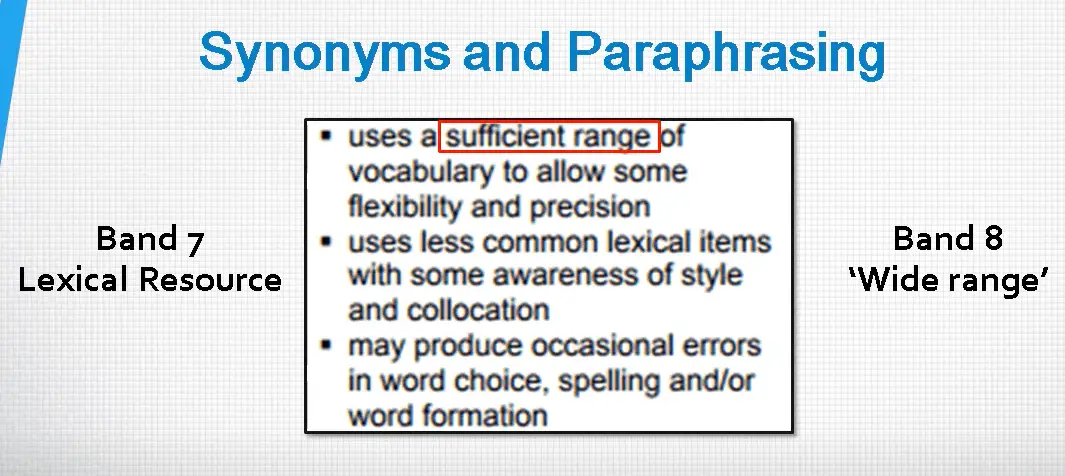
I am going to show you exactly how to paraphrase in IELTS writing and speaking so you can show a wide range of vocabulary to the examiner and increase your band score.
You can either watch the video below or read the article, the information is the same:
You can get my full video course covering every part of the test here!
How Do You Paraphrase For IELTS?
(How to paraphrase the question in IELTS writing)
Method 1: The Simple Synonym Sauce
The first and most obvious way we can show that we have a good range of vocabulary in the IELTS writing tasks is to use synonyms for the words that we are given in the question.
The words we substitute in are simply words that have a similar or the same meaning as the word they are replacing. We do this particularly when we are writing introductions to our IELTS essays in IELTS writing task 2.
You can practice using synonyms by using an online thesaurus. When you are doing practice essays, you can simply look up a word and see what other words have a similar or same meaning. Many of my students then like to keep their own written record of the synonyms they are using as IELTS topics often repeat themselves.
Let’s just have a quick look at synonyms for the word environment, which often occurs in essay questions, as provided by synonym.com and it gave me these words: ecology, habitat, geographical area settings, surrounding situation, circumstances and background.
The words ‘ecology, habitats and geographical area’ are more suitable to be used when we’re replacing the word environment, when it’s being used to talk in relation to animals.
Other words, such as ‘setting, surrounding situations, circumstances and background’ are talking about general conditions that are not related to animals and so would not fit into our essay well.
So, we have to be quite careful that we don’t use synonyms in the wrong context, nevertheless it is the easiest way to paraphrase successfully.
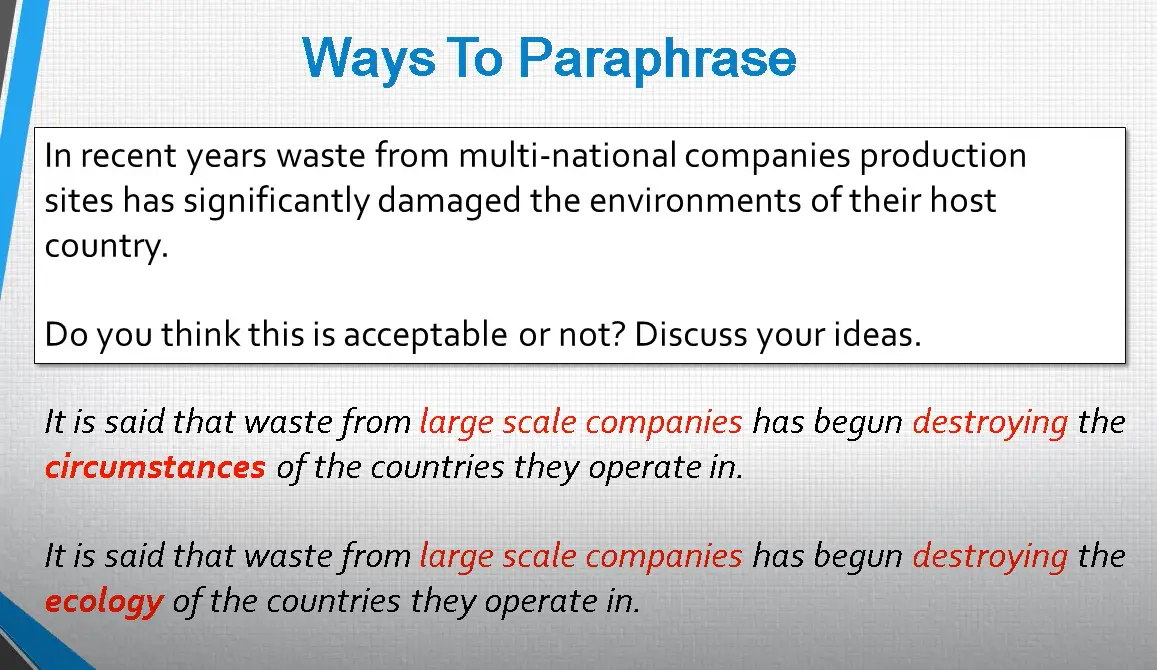
Method 2: Paraphrase to Perfection!
Using synonyms all the time can look a bit unnatural, but if we change the order in which we use them, then it can make it look more natural.
Here’s another example question:
Some people believe that getting a degree from university is the best way to guarantee getting a job. Others believe it would be best to go straight into work and get experience. Discuss both sides and give your opinion.
So, if you were writing the introduction to this essay, normally you would first paraphrase the question. So you could write:
Certain people think that graduating from higher education is the optimum way to assure getting a top job.
So:
‘some people’ = ‘certain people’
‘graduating from higher education’ = ‘getting a degree from a university’
‘best way to guarantee getting a job’ = ‘optimum way to assure getting a top job.’
That is how you can use synonyms, the examiner will see that and it’s very obvious to them. However, we could also switch the order of the sentence around as well. So it reads like this.
The optimum way to assure getting a top job is by graduating from higher education, according to certain people.
This shows that we can be flexible with how we write and shows that we have a good command and control of grammar. In my full course, we will cover more aspects of grammar such as complex sentences, common mistakes, and tenses – take a look.
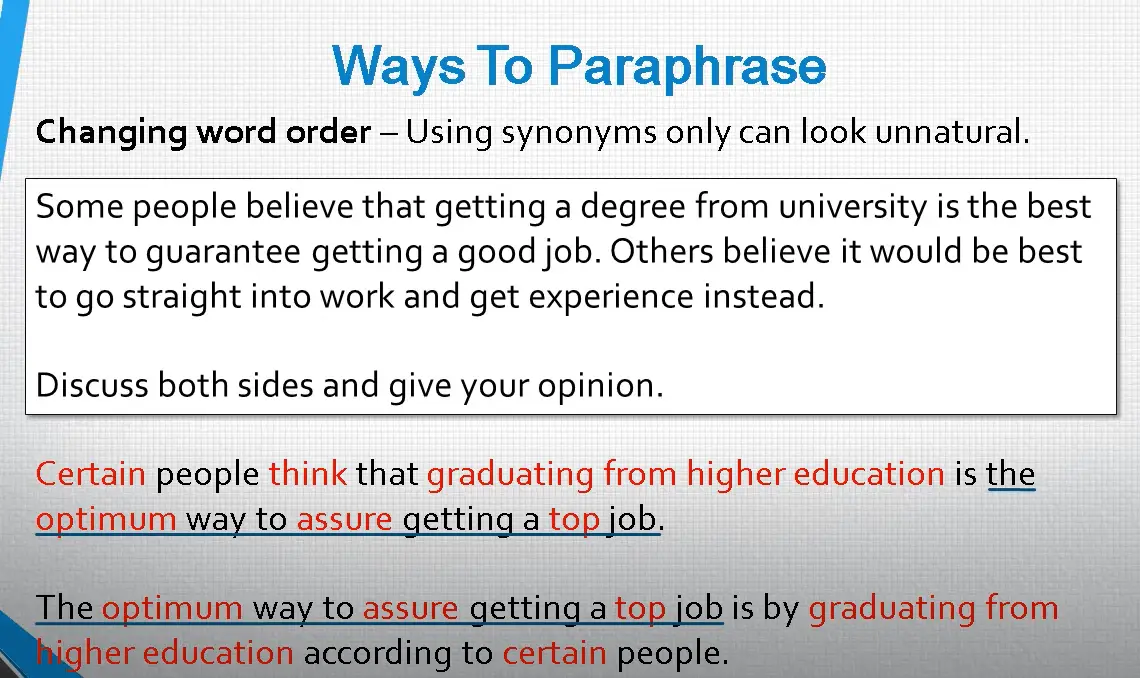
Method 3: Fun with formations!
This next way of paraphrasing is to change the word formations that are used, you might read the question and one word might stand out to you that you think you could use a different formation for of that word.
In this question here, for example:
Many small shops are closing as they are unable to compete with large supermarkets in the area here.
The word competes might stand out to you and you immediately perhaps think of the word competition so we could simply try to use that form of the word along with the synonyms as well.
So, next you might come up with the sentence.
A large number of less well-known outlets are shutting due to competition from established superstores in the locality.
Now we’ve got synonyms and we’ve got ‘competition’ in there as a change in word formation.
We could also go one step further and change the order of the sentence as well. It could read:
Competition from established superstores in the locality is forcing a large number of less well-known outlets to shut down.
As you can see, what we’re starting to do is mix together different ways to paraphrase, which is really a very powerful way to impress the examiner. You’ll find more like this in my full course here.
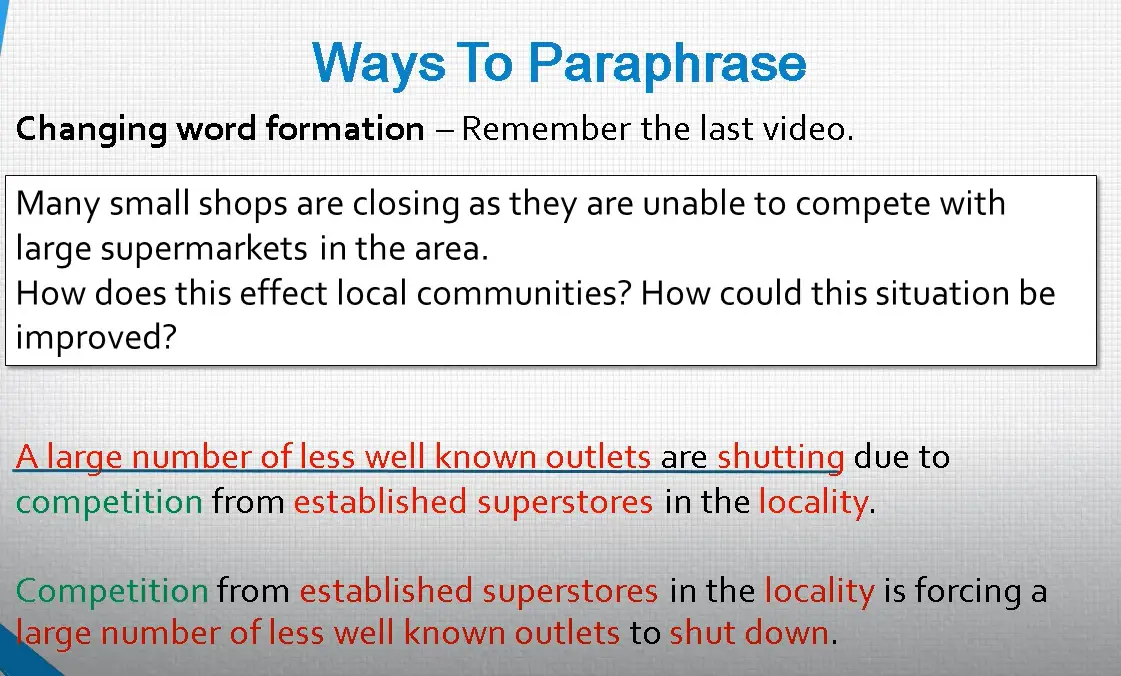
Method 4: Antonym Soup!
One more thing we can do is to use antonyms. An antonym is basically a word that has the opposite meaning to another word.
So, synonyms mean similar or the same antonyms mean the opposite. So again, for the same question, we might have the same sentence.
A large number of less well-known outlets are shutting due to competition from established superstores in the locality.
But we might choose to use antonyms. Instead of using a large number, we might simply say fewer.
So ‘fewer, less well-known outlets can remain open.
Obviously, ‘remain open’ is an antonym for shutting. So, by using antonyms, we can keep the meaning the same, but once more show off different vocabulary that we are able to use.
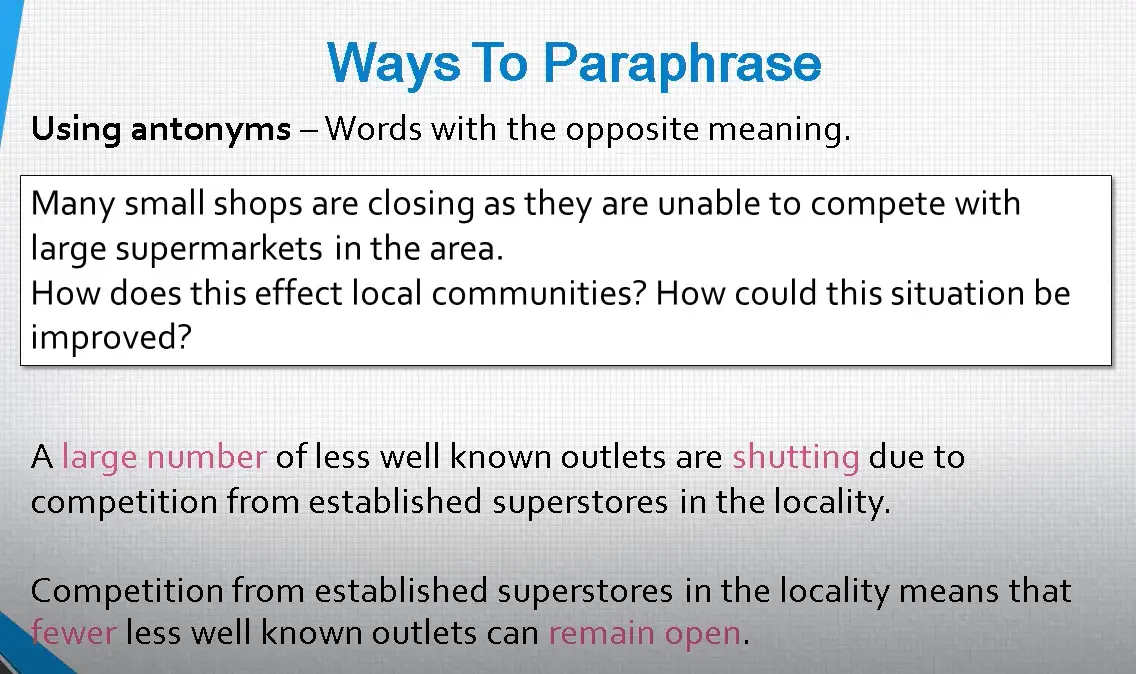
Method 5: The Native Speaker Way of Paraphrasing
Now, the final way to paraphrase, and I would call this the native speaker way, because it’s what I would do and what other native speakers would probably do. This is what band 8 and 9 candidates should be aiming to do because it’s just a very natural technique.
Firstly, imagine if you were paraphrasing in your own language, just think how easy it would be. You would just look at a sentence and just say it in different words.
You wouldn’t even be thinking about how you were going to break it down or what grammar you were going to use, or even what words you were going to say!
You would just come out with a sentence that made perfect sense and have the same meaning. And that is the native speaker way to paraphrase.
Now, have a go at paraphrasing this question below using the native speaker method:
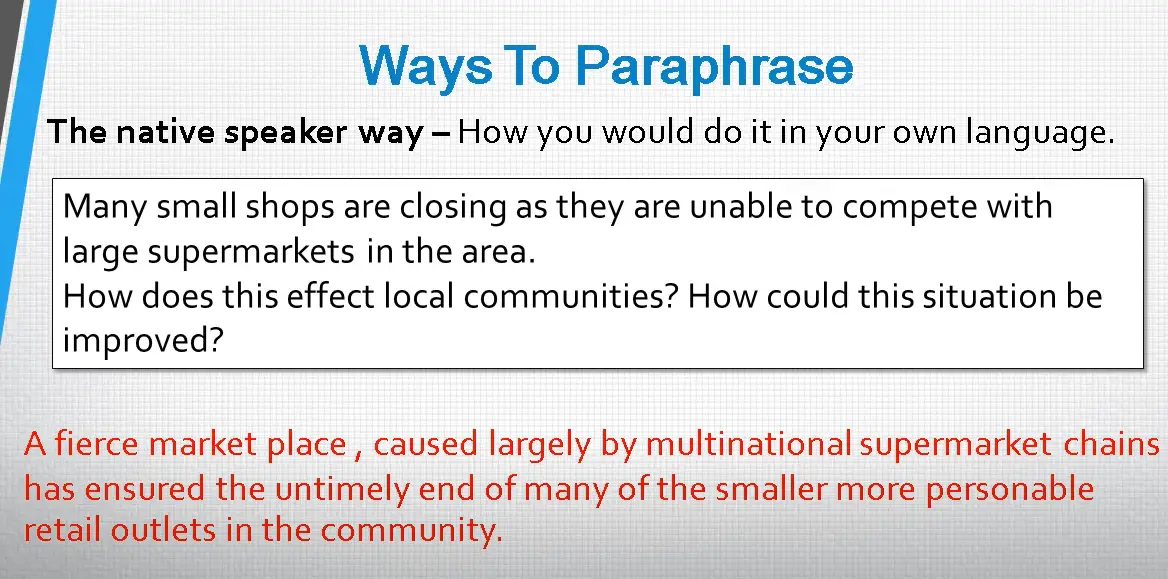
So, there’s lots of natural language in there, some collocations, some synonyms from, but they’re not really deliberate. It’s just what naturally came out of my mouth as a native speaker. And when you get to this level, you might be able to do something similar. It’s what you can aim for.
Check Out My Complete Guide To IELTS Course Here
Final Words of Advice for IELTS Paraphrasing
And finally, just a few words of advice. Now, remember, we are looking at synonyms and paraphrasing because we want to show the examiner that we have a sufficient range of vocabulary to answer the question.
It is important that we do this, but remember, your essay is marked on many different things and not just on the vocabulary. So, don’t get fixated on this.
Don’t spend too long thinking about the synonyms or paraphrases that you’re trying to use, you still need to write good, solid body paragraphs. You still need a good conclusion and you need time to be checking that as well. So, yes, pay attention to paraphrasing, but don’t focus on it so much that it disrupts the rest of your essay.
And the best way to develop your paraphrasing skills reading. Reading over the medium to long term. Exposing yourself to different word sets in different contexts gives you the experience to be able to know how words fit together and replace other words.
So keep reading my friends! That’s the main thing you need to do.
Final, final IELTS Paraphrasing Tips!
Don’t go over the top, it is very difficult to find a synonym for some words and you won’t always be able to do so. Instead, you could try a group of words, so, rather than saying ‘adult’, you might say ‘grown up’.
However, if you can’t think of a paraphrase of synonym then don’t be afraid to use the words in the question. It is more important to be accurate with your word choice then to try lots of different synonyms. Always choose the words that you know to be 100% correct, in that way you will reduce your mistakes and increase your band score.
How can I improve my paraphrasing? With IELTS paraphrasing exercises of course! Here we go…
IELTS Paraphrasing Exercise 1
To practice this technique, ideally you will need a partner. All you need to do is to select a text related to any of the 14 main topic areas that often come up in IELTS.
This could be from a newspaper, journal or book. Next, print out the text and then with a black marker pen or using tip-ex remove random key words from a text. The article can be as short or as long as you like.
You might end up with something like this article from the BBC web-site:
For Your Partner To Complete:
A new study reveals how crocodiles’ eyes are fine-tuned for lurking at the water __________ to watch for prey.
The “fovea”, a patch of tightly packed receptors that _________ sharp vision, forms a horizontal streak instead of the usual circular spot.
This allows the animal to scan the ___________ without moving its head, according to Australian researchers.
They also found differences in the cone cells, which ____________ colours, between saltwater and freshwater crocs.
Swap articles with your partner and try and complete the missing words. Ask yourself what type of word is missing; is it an adjective, noun, verb or adverb? Once you have identified this, have a guess at what word might fit.
Following this, view the completed text and see if you have selected the same word, or a word that is a synonym (a word with the same meaning).
The more synonyms and correct guesses you manage to get the better. Doing this increases your synonym power which will have a positive impact on virtually all parts of the IELTS test.
The missing words in this case are: surface (noun), delivers (verb), shoreline (noun), senses (verb).
IELTS Paraphrasing Exercise 2
Select an article you have read recently that you have found difficult. Ideally this will be on a typical IELTS related topic.
Now, write or type out 20 words that you found difficult on to pieces of small card. Place the cards face down in the middle of the table in a pile.
Turn over the first card and try to make a sentence using a synonym for that word, or if you can’t use a synonym by using a group of words (paraphrase) instead.
Immediately check your answers online with a synonym generator or with your teacher or a study partner.
If you get a particular word wrong then put the card to the bottom of the pile and come back to it again later. If you are correct place it in a new pile.
You can alternate ‘goes’ with a partner’ and score points in this manner.
Alternatively, with all of the cards face up, candidates could say a synonym or paraphrase for one of the words and a partner guesses which word it is, again with a competitive element.
Advanced students could then spread the cards face down in front of them and then summarise the entire text verbally being careful to use synonyms or paraphrases of the words only.
This could then be written up from memory as a summary task to consolidate the new vocabulary.
IELTS Paraphrasing in the Reading Test
Once you get good at synonyms and paraphrasing you may start to realise how IELTS reading papers are actually written.
Basically, an article is selected and the questions that test your understanding of the text are written.
However, examiners cannot just use the same words in the text, as that would make it too easy. So, instead they ask the questions using different words, synonyms or paraphrases.
Once you have spotted this pattern and practised a great deal as above, you will find the IELTS test gets a lot easier.
Use The 3 R’s For IELTS Synonym and Paraphrasing Success
As you are doing exercises such as those above, you need to:
Record – Make note of all the new words you are learning. Include a definition, example sentences, synonyms and a personalised picture to help make it memorable.
Review – Set aside a specific time each day when you can remind your self of the new words. Ten minutes a day is better than 70 minutes once a week. Regular practice is key.
Re-test – Test yourself to see how well you are doing and identify areas of weakness. Why not have a competition with a study partner for added motivation.
You could use a software service such as Quizlet to help you do this.
Doing this will give you the maximum chance of remembering all your synonyms and paraphrases and ultimately improve your IELTS band score!
OK, that’s enough about IELTS synonyms and paraphrasing. I hope we got a lot out of this article. And please remember where you’re going. You’re on this journey of working out how to do the IELTS test so that you can transform your life into a better future, use that as motivation to keep going! Drop any questions below
You might also like to read about complex sentences here.
Recommended IELTS Study Tools
Thank you for reading this article. I always get lots of questions about how else to get a better band score quickly. So, this is what I recommend:
Complete IELTS Course: Of course, my full course ‘INCREASE YOUR IELTS‘ covers everything you need to need to know to pass IELTS, including practice questions, model answers, grammar work, strategies for every possible reading, writing and listening question type, as well as a complete speaking course too, check it out here.
IELTS Essay and Speaking Feedback: To complete full mock tests and get feedback from IELTS examiners on your IELTS essays or speaking tasks then visit: IELTS Feedback and Mock Tests, here.
Improve your grammar fast by using the Grammarly suggestions to improve your writing. Every IELTS students should have this free grammar improving tool.
Improve all-round English skill with EnglishClass101.com. If you have failed IELTS more than once then you probably need to improve your general level of English. Use the free online lessons and vocabulary building tools here and start improving today! HIGHLY RECOMMENDED!


